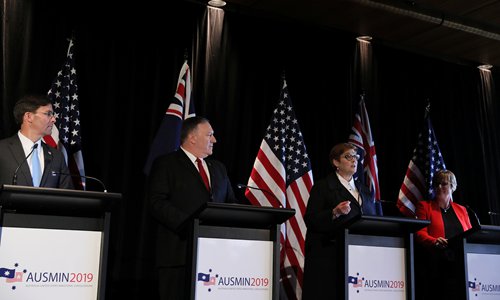HOME >> OPINION
Policy anxieties loom as Australia wedged between China and US
By Mark Beeson Source:Global Times Published: 2019/8/14 19:58:19

Photo: VCG
It's not easy being an Australian policymaker these days. Navigating between the economic attractions of China and what Australia's leaders still see as the necessity of the US security guarantee is quite a challenge. Whether the US can actually be relied upon to fulfill its notional strategic obligations is in some ways beside the point: Australia's growing army of increasingly hawkish strategic analysts generally assumes it can and that shapes policy.
Many in China have been upset about, even infuriated by, Australia's ties with the US at the best of times. But now is not the best of times, and that helps explain attitudes in Australia's policymaking establishment. Australia's strategic elites are a surprisingly anxious bunch, taking our relative isolation as a source of vulnerability, not strength. Hence the desire to spend enormous amounts of money - by our standards - on a new generation of submarines and fighter aircraft.
Those of us who think that this money might be better spent on real security threats such as climate change never have had much influence. Now we are studiously ignored and judged to be out of touch with strategic reality. At a time when both China and the US are ramping up defense spending, though, it is not hard to see why the strategic "realists" in Australia carry the day.
There is a growing chorus of inflammatory cold war rhetoric and heightened strategic tension around the rivalry between China and the US. It may prove difficult for Australian policymakers to resist US pressure for a greater commitment to "containing" China, especially when this language is echoed in Australia. That such efforts are likely to prove futile and almost certain to provoke precisely the behavior they are intended to discourage is unlikely to influence the debate in Australia.
So far Australian officials have resisted the suggestion made by US Secretary of State Mike Pompeo during the recent AUSMIN (Australia-US Ministerial Consultation) bilateral talks. Pompeo suggested that Australia might host US missiles in Darwin, capital and chief port of Northern Territory, Australia. While this may be in keeping with US repudiation of existing arms control treaties, a regional or global arms race is hardly in Australia's national interest. The presence of US missiles in Australia's north would do little for regional stability and send an unequivocally negative signal to China.
In many ways, Australia is the architect of its own problems. A long-standing pattern of offering uncritical support for whichever foreign adventure the US embarks on gives the current generation of policymakers little room for maneuver - even if we assume they wanted to, of course. In reality, Australia has actually been pushing the US to renew its commitment to the region by redefining it as the Indo-Pacific.
The Indo-Pacific idea, which conspicuously excludes China, finds its most tangible strategic manifestation in the Quadrilateral Security Dialogue, also known as the Quad, a grouping that also includes Japan and India, as well as the US and Australia. Although they might be reluctant to say so, this grouping is a consequence of China's rise and the alarm this has generated among those in Australia more focused on security rather than economics.
Even in the economic arena, however, anxiety levels are rising. There is a heightened awareness of just how economically dependent Australia is on China, and how vulnerable it is to the latter's growing geo-economic leverage. The additional customs inspections that have held up coal exports - our largest export to our biggest customer - are a dramatic illustration of what the Chinese government, if forced to become unfriendly, might do to make life uncomfortable for its opposite numbers in Canberra. Getting caught in the middle of a global currency war won't do much for Australia's economic prospects either.
These developments have significance beyond Australia's relationship with China. One of the great hopes of many liberal observers has been that economic interdependence will enhance the prospects for peace as everyone recognizes they have too much to lose and nothing to gain by jeopardizing the mutually beneficial status quo. Growing animosities, suspicions and anxieties are putting this idea to a searching test.
Middle powers such as Australia could potentially play a useful role in convincing great powers like China and the US to dial back the rhetoric and pursue some much-invoked but seldom seen win-win diplomacy. To do this, however, its policymakers would need to be independent and feel secure. Neither looks a terribly likely prospect at present. Australian policymakers may be overly anxious and fawning at times, but the actions of the region's great powers aren't exactly encouraging creative thinking either.
The author is professor of University of Western Australia. His latest book is Rethinking Global Governance (Palgrave). opinion@globaltimes.com.cn
Newspaper headline: Policy anxieties with Australian characteristics
Posted in: VIEWPOINT